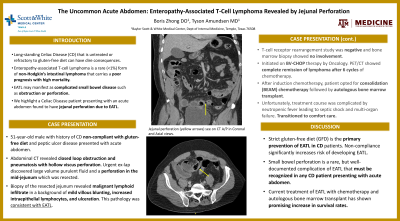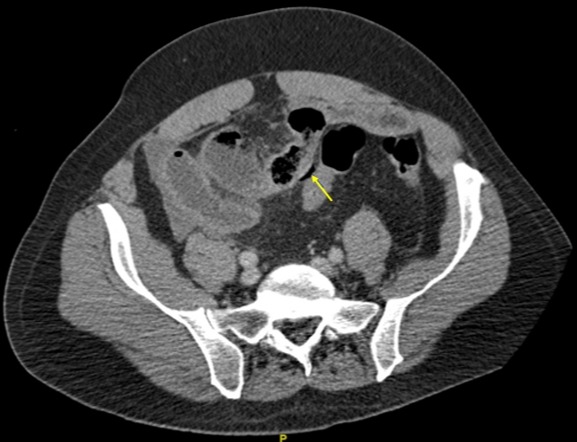Back


Poster Session B - Monday Morning
Category: Small Intestine
B0669 - The Uncommon Acute Abdomen: Enteropathy-Associated T-Cell Lymphoma Revealed by Jejunal Perforation
Monday, October 24, 2022
10:00 AM – 12:00 PM ET
Location: Crown Ballroom

Has Audio

Boris Zhong, DO, MS
Baylor Scott & White
Temple, TX
Presenting Author(s)
Tyson Amundsen, MD1, Boris Zhong, DO, MS2, James Mason, DO3
1University of Tennessee Health Science Center, Bartlett, TN; 2Baylor Scott & White, Temple, TX; 3Baylor Scott and White Health, Temple, TX
Introduction: Long-standing Celiac disease that is untreated or refractory to gluten-free diet can have dire consequences. Among these, Enteropathy-associated T-cell Lymphoma (EATL) is a rare form of non-Hodgkin’s intestinal lymphoma that carries a poor prognosis with high mortality. This neoplasm can manifest as complicated small bowel disease such as obstruction or perforation. We present a patient with Celiac Disease presenting with an acute abdomen found to have jejunal perforation due to EATL.
Case Description/Methods: A 51-year-old male with history of biopsy-confirmed Celiac Disease (CD) presented for severe abdominal pain. Vital signs were stable and laboratory findings showed leukocytosis and lactic acidosis. Abdominal CT revealed closed loop obstruction and pneumatosis with hollow viscus perforation. He was taken to the OR for urgent exploratory laparotomy where purulent fluid and a perforation in the mid-jejunum was discovered. Subsequent jejunal resection with primary anastomosis was performed. Post-operative course was complicated by ileus and urinary retention but ultimately made full recovery.
Biopsy of the resected jejunum revealed malignant lymphoid infiltrate in a background of mild villous blunting, increased intraepithelial lymphocytes, ulceration, perforation, and acute serositis consistent with EATL.
Follow-up endoscopy was consistent with known CD, but otherwise unremarkable. T-cell receptor rearrangement study and bone marrow biopsy were negative. He was initiated on BV-CHP chemotherapy and achieved complete remission after 6 cycles. After induction, he opted for consolidation (BEAM) chemotherapy followed by autologous bone marrow transplant. Unfortunately, this treatment course was complicated by septic shock with multi-organ failure and ultimately decision was made for comfort care.
Discussion: Strict gluten-free diet (GFD) is the primary prevention of EATL in CD. Non-compliance to GFD has been shown to significantly increase risk of developing EATL. Small bowel perforation is a rare, but well-documented complication of EATL that must be recognized in CD patients presenting with acute abdomen. Current treatment of EATL with chemotherapy and autologous bone marrow transplant has shown promising improvement in survival rates and reduced mortality rate. For CD patients, strict adherence to GFD with close clinical monitoring is of utmost importance to improve quality of life, minimize progression of EATL, and prevent necessity of risky advanced interventions as highlighted in our case.

Disclosures:
Tyson Amundsen, MD1, Boris Zhong, DO, MS2, James Mason, DO3. B0669 - The Uncommon Acute Abdomen: Enteropathy-Associated T-Cell Lymphoma Revealed by Jejunal Perforation, ACG 2022 Annual Scientific Meeting Abstracts. Charlotte, NC: American College of Gastroenterology.
1University of Tennessee Health Science Center, Bartlett, TN; 2Baylor Scott & White, Temple, TX; 3Baylor Scott and White Health, Temple, TX
Introduction: Long-standing Celiac disease that is untreated or refractory to gluten-free diet can have dire consequences. Among these, Enteropathy-associated T-cell Lymphoma (EATL) is a rare form of non-Hodgkin’s intestinal lymphoma that carries a poor prognosis with high mortality. This neoplasm can manifest as complicated small bowel disease such as obstruction or perforation. We present a patient with Celiac Disease presenting with an acute abdomen found to have jejunal perforation due to EATL.
Case Description/Methods: A 51-year-old male with history of biopsy-confirmed Celiac Disease (CD) presented for severe abdominal pain. Vital signs were stable and laboratory findings showed leukocytosis and lactic acidosis. Abdominal CT revealed closed loop obstruction and pneumatosis with hollow viscus perforation. He was taken to the OR for urgent exploratory laparotomy where purulent fluid and a perforation in the mid-jejunum was discovered. Subsequent jejunal resection with primary anastomosis was performed. Post-operative course was complicated by ileus and urinary retention but ultimately made full recovery.
Biopsy of the resected jejunum revealed malignant lymphoid infiltrate in a background of mild villous blunting, increased intraepithelial lymphocytes, ulceration, perforation, and acute serositis consistent with EATL.
Follow-up endoscopy was consistent with known CD, but otherwise unremarkable. T-cell receptor rearrangement study and bone marrow biopsy were negative. He was initiated on BV-CHP chemotherapy and achieved complete remission after 6 cycles. After induction, he opted for consolidation (BEAM) chemotherapy followed by autologous bone marrow transplant. Unfortunately, this treatment course was complicated by septic shock with multi-organ failure and ultimately decision was made for comfort care.
Discussion: Strict gluten-free diet (GFD) is the primary prevention of EATL in CD. Non-compliance to GFD has been shown to significantly increase risk of developing EATL. Small bowel perforation is a rare, but well-documented complication of EATL that must be recognized in CD patients presenting with acute abdomen. Current treatment of EATL with chemotherapy and autologous bone marrow transplant has shown promising improvement in survival rates and reduced mortality rate. For CD patients, strict adherence to GFD with close clinical monitoring is of utmost importance to improve quality of life, minimize progression of EATL, and prevent necessity of risky advanced interventions as highlighted in our case.

Figure: Axial view of Abdominal CT showing perforation of small bowel
Disclosures:
Tyson Amundsen indicated no relevant financial relationships.
Boris Zhong indicated no relevant financial relationships.
James Mason indicated no relevant financial relationships.
Tyson Amundsen, MD1, Boris Zhong, DO, MS2, James Mason, DO3. B0669 - The Uncommon Acute Abdomen: Enteropathy-Associated T-Cell Lymphoma Revealed by Jejunal Perforation, ACG 2022 Annual Scientific Meeting Abstracts. Charlotte, NC: American College of Gastroenterology.
